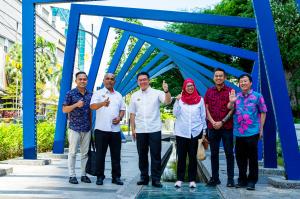Nga Kor Ming Elected President of UN-Habitat: Malaysia’s Visionary Minister - A New Era for Urban Transformation
YB Nga Kor Ming’s election as UN-Habitat President marks a Malaysian first and champions development rooted in compassion, not concrete.
We must remind ourselves that the goal is not just to make cities liveable,” he concluded, “but to make them loveable.”
KUALA LUMPUR, MALAYSIA, October 20, 2025 /EINPresswire.com/ -- The world’s cities stand at a crossroads. As urbanisation accelerates, the choice before humanity is stark: build cities that divide, or cities that dignify.Into this moment steps YB Nga Kor Ming, Malaysia’s Minister of Housing and Local Government newly elected President of the United Nations Human Settlements Programme (UN-Habitat) Assembly for a two-year term beginning in 2025.— YB Nga Kor Ming
For Malaysia, his election represents a historic milestone the first time the nation will preside over the UN-Habitat Assembly. For the global community, it marks the arrival of a leader who believes that the truest measure of development is not concrete, but compassion.
YB Nga Kor Ming has spent his career asking a deceptively simple question: What makes a city liveable? For him, the answer has always gone beyond architecture and infrastructure. It lies in the dignity of its people, in homes built not only of bricks, but of belonging.
“A house is not built by bricks and mortar,” he told delegates in Nairobi. “A home is built by hope and dreams.”
That sentiment has guided Nga’s work across Malaysia, where he has built a reputation as one of Southeast Asia’s most forward-looking policymakers in housing and urban transformation. Under his leadership, Malaysia’s Ministry of Housing and Local Government (KPKT) has prioritised urban rejuvenation, affordable housing, and sustainable community planning initiatives that balance growth with inclusivity.
He advances the Malaysia SDG Cities initiative, integrating smart technology and green infrastructure into Malaysia’s local councils. His push for urban regeneration has transformed underdeveloped areas into thriving, people-centred spaces, while ensuring that cultural heritage remains intact.
“If we do not want our cities to deteriorate and become slums,” he said, “urban renewal, rejuvenation, and regeneration are the way forward.”
Nga’s appointment as President of UN-Habitat is no coincidence it’s the culmination of two decades of consistent, people-first leadership. His approach to governance blends pragmatism with moral clarity: results grounded in empathy, progress rooted in purpose. At home, Nga’s ministry has introduced policies to expand access to affordable housing, strengthen waste management and sustainability frameworks, and elevate community resilience in the face of climate change. Internationally, he has championed cross-border collaboration on sustainable development, ensuring that the Asia-Pacific region’s urban progress aligns with the UN’s Sustainable Development Goals (SDGs), especially Goal 11: Sustainable Cities and Communities.
“Leadership is not a title,” he reminded the Assembly. “It’s a responsibility. As President of UN-Habitat, I will lead by example to ensure that development begins and ends with humanity.”
Nga’s election reflects Malaysia’s growing influence in global policy discourse a testament to the nation’s evolution from industrial economy to sustainability innovator. Under his stewardship, Malaysia has advanced its Smart City Framework, integrating digital technology, renewable energy, and citizen engagement to create cities that are both intelligent and inclusive. The country has also gained recognition for its National Affordable Housing Policy, designed to provide safe, dignified homes for every Malaysian family regardless of income.
His presidency is, in many ways, an international recognition of this domestic success proof that Malaysia’s model of urban transformation, grounded in balance and humanity, has something vital to offer the world. Over the next two years, as President of the UN-Habitat Assembly, Nga will lead efforts to address the world’s most pressing urban challenges from housing inequality and slum proliferation to climate resilience and social inclusion.
His agenda is clear and urgent:
To drive urban renewal and regeneration as engines of dignity.
To position human wellbeing as the defining metric of development.
And to restore trust and collaboration between nations, communities, and citizens.
“Urbanisation is not a threat,” he told delegates. “If guided with heart, it becomes humanity’s greatest opportunity. Cities are not made of concrete alone they are built of people’s dreams. When citizens fall in love with their city, they protect it, they grow it, and they make it last.”
Nga Kor Ming’s presidency could not come at a more pivotal moment. With more than 70% of humanity expected to live in cities by 2050, the choices made today will define the moral and environmental landscape of tomorrow. His leadership brings an Eastern pragmatism to a global debate — blending Malaysia’s lived experience of rapid urbanisation with a universal call for empathy in planning, equality in housing, and renewal in purpose.
“We must remind ourselves that the goal is not just to make cities liveable,” he concluded, “but to make them loveable.”
About YB Nga Kor Ming
YB Nga Kor Ming is Malaysia’s Minister of Housing and Local Government and a veteran statesman known for his commitment to inclusive development. With a career spanning over two decades, he has championed policies on affordable housing, green urban planning, and sustainable local governance. In 2025, he will represent Malaysia as President of the UN-Habitat Assembly, leading international efforts to build cities that are not only functional, but profoundly human.
Alfie Brown
A-B MEDIA
+44 7876 586946
email us here
Legal Disclaimer:
EIN Presswire provides this news content "as is" without warranty of any kind. We do not accept any responsibility or liability for the accuracy, content, images, videos, licenses, completeness, legality, or reliability of the information contained in this article. If you have any complaints or copyright issues related to this article, kindly contact the author above.

